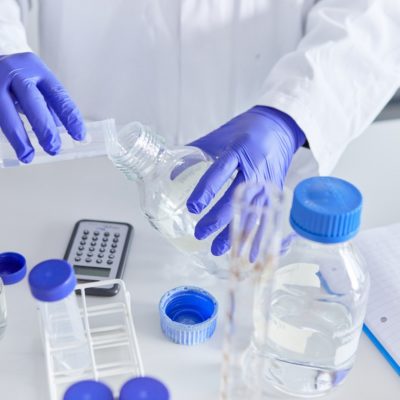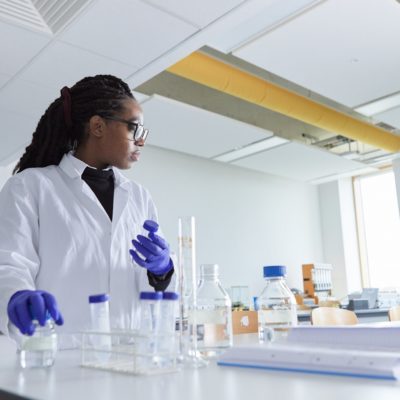
Alexandra Woodacre
Senior Lecturer in Molecular Bioscience
Faculty of Arts, Science and Technology
DiscoverGet in touch with us as we may be able to offer you a place for September 2024 through Clearing.
UCAS Code
BSc: C900
BSc with Foundation: B901
Level
UndergraduateUG
BSc (Hons)Duration
Full Time: 3 years
Full Time Foundation: 4 years
Part Time: 4 years
Starting
September
BCC at A Level or,
DMM at BTEC
Fees UK 24/25
Full Time: £9,250
Part Time: £1,540 per 20 credit module
Integrated Foundation Year: £9,250
Fees International 24/25
Full Time: £15,200
Integrated Foundation Year: £15,200
Location
For questions regarding study and admissions please contact us:
Our Biological Sciences BSc degree enables you to study and investigate the diverse aspects of the biological, environmental and life sciences in order to develop a detailed knowledge and understanding of the interconnection between organisms and the environment.
In the first year, you will study a broad programme of compulsory modules, giving you a firm knowledge base in subjects like Biochemistry, Cell Biology, Ecology, Evolution, Microbiology and Anatomy. In the second and third year, you have the opportunity to specialise in a variety of topics, choosing from a range of biology, biomedical, ecology and environmental science disciplines, which allows you to design your biological sciences degree to meet your future career.
Updated 03/07/2024






The University of Northampton’s Biological Sciences course has been designed to contribute towards achieving the following United Nations Sustainable Development Goals:
A wide and diverse range biological aspects of science are explored throughout this degree programme. This Biological Sciences interdisciplinary degree provides you with the opportunity to develop a broad knowledge base in the first year of study before specialising in topics and disciplines in the second and third year.
You will have the opportunity to choose modules that most interest you or ones that specifically meet your future career aspirations. You can choose from varied aspects of biological science including plant and animal biology, genetics, environmental science, microbiology, human biology, ecosystems, pharmacology, ecology, adaptations to life, neuroscience and biochemistry.
You will apply your knowledge throughout your biological sciences degree and recognise its relevance to society at national and global levels. You also have the opportunity to learn a wide range of laboratory and field skills as well as learning about current issues and research areas.
You may also elect to take the Life Science Placement Year module after your second year before returning to complete your degree. We will help you find this paid placement and support you during this year.
Our modules are informed by staff who are active researchers in their specialist areas, introducing you to scientific principles to help you develop analytical skills and encourage you to evaluate and recommend solutions to real-world biological problems.
You will be supported during your final year research project by a supervisor with relevant research expertise and by studying the second year research methods and specialised laboratory and/or fieldwork modules with essential training in the latest techniques. You even have the opportunity to present your own final year research dissertation at our annual research conference.
Please note the modules shown here relate to the academic year 24/25. The modules relating to the academic year 25/26 will be available from June 2025.
A typical offer for this biological sciences degree would be:
In addition, you are expected to have studied a natural science subject (preferably Biology or Human Biology but Chemistry and Physics are also accepted) in an A Level at grade C, or equivalent qualification such as International Baccalaureate.
We welcome international applicants and applications from students with a range of non-traditional educational or professional qualifications, as well as applications from students with a mix of A levels and BTEC/Cambridge Technical qualifications.
For more information on how to make an application for this biological sciences degree, please visit our How to Apply page.
Admission to the BSc Honours Biological Sciences 4 year Programme with Foundation Study is normally:
In addition, you are expected to have studied a natural science subject (preferably Biology or Human Biology but Chemistry and Physics are also accepted) in an A Level at grade d, or equivalent qualification such as International Baccalaureate.
However, we would also like to hear from you if you have professional or industry experience instead, a range of other qualifications or self-developed subject knowledge that relates to the course you wish to study.
All International and EU students applying for a course with us must meet the following minimum English language requirements:
For information regarding English language requirements at the University, please see our IELTS page.
If you are an International student and would like information on making an application, please see our How to Apply page.
Fees quoted relate to study in the Academic Year 24/25 only and may be subject to inflationary increases in future years.
There are no additional costs for this course for students beginning their studies in September 2024. Should this change, applicants and students will be contacted by the university with details of the costs.
Fees quoted relate to study in the Academic Year 23/24 only and may be subject to inflationary increases in future years.
There are no additional costs for this course for students beginning their studies in September 2023. Should this change, applicants and students will be contacted by the university with details of the costs.
For information on the scholarships available to you, please see our scholarships page.
For more information about possible funding options, please visit our Fees and Funding pages.
Accreditation of this Biological Sciences degree is pending from the Royal Society of Biology – the leading professional body for the biological sciences in the United Kingdom.
The Integrated Foundation Year (IFY) offers a new and exciting route into studying for a degree, attracting ambitious and driven students who are willing to learn and advance.
If you have non-standard qualifications or do not quite meet the admissions requirements we can offer you a fantastic opportunity to study a four year programme which includes an Integrated Foundation Year. The Integrated Foundation Year will help you develop the theoretical/practical and academic skills you need, in order to successfully progress to the full award.
Our four year courses will enable you to successfully follow the degree pathway of your choice while gaining essential study skills. The foundation year of your chosen degree will be studied on a full-time basis and is aimed at supporting the transition to higher education. Years two, three and four are then studied as a standard degree programme.
At the University of Northampton, everything we do, from funded trips to paid internships, is to give you everything you need to make a difference when you leave.
If you join our full-time Biological Sciences degree at the University of Northampton, you will receive a laptop when your course begins*. The laptops are built to a bespoke custom specification ideal for use in the seminar room, collaborative group work or studying at home.
Whatever your ambitions, we’re here to help you to achieve them. We’ll support you to identify the skills you’re learning during your biological sciences course, find your strengths and secure practical experience so that when it comes to applying for jobs or further study you’ll feel confident in standing out from the crowd. We’ve created the Northampton Employment Promise because we are so confident that if you focus on your studies and complete one of our awards you’ll be highly employable by the time you graduate. Putting you in a great position to secure employment or continue your studies.
To check out the full list of perks, visit our Student Perks page or dedicated International Perks page.
*UK fee payers only (see Terms and Conditions for further details).
You may also elect to take the Life Science Placement Year module after your second year before returning to complete your Biological Sciences degree. This is an optional and paid placement year, working within industry. Students who complete this typically achieve higher degree outcomes and have improved employability. The University has a whole team of people to help you find a paid placement and will support you during this year.
We aim to make learning an engaging and enjoyable experience from our extensive online resources and face to face teaching. We will introduce you to science principles, help you to develop analytical skills and encourage you to evaluate and recommend solutions to real-life, local to global, biological problems.
Teaching and learning occurs through a variety of methods, with laboratory practicals, workshops, learning how to use new software, fieldwork, seminars and lectures.
Modules are typically semesterised, which means that modules are delivered in either the Autumn Term or the Spring term. You will have four hours of contact time per week to enable you to get the most out of practical sessions, workshops and field visits.
All the module tutors use our virtual learning environment (NILE) to provide additional resources to facilitate your independent learning.
Each module typically has four hours per week contact time and students typically study three modules per week. In addition, all students are allocated a personal tutor before they start their degree. They will meet with their personal tutor on a regular basis and are able to book office hours with them for both academic and pastoral support.
Assessment methods in this biological sciences degree include writing scientific reports, blogs, articles, giving presentations, and taking time constrained assessment and exams. Many modules are assessed through 100% coursework but some modules have exams that could be worth up to 60% of the final module grade.
Open Days give you the best experience and insight to courses, people and facilities that interest you. Make your choice easier and come meet us.
Senior Lecturer in Molecular Bioscience
Faculty of Arts, Science and Technology
DiscoverProfessor of Molecular Medicine
Faculty of Arts, Science and Technology
DiscoverSenior Lecturer in Waste Management
Faculty of Arts, Science and Technology
DiscoverProfessor of Molecular Medicine
Faculty of Arts, Science and Technology
DiscoverAssociate Professor in Human Genetics & Genomics
Faculty of Arts, Science and Technology
DiscoverSenior Lecturer in Microbiology
Faculty of Arts, Science and Technology
DiscoverSenior Lecturer in Human Nutrition
Faculty of Health, Education and Society
DiscoverSenior Lecturer in Molecular Bioscience
Faculty of Arts, Science and Technology
DiscoverThis Biological Sciences course will open up a range of career opportunities, including:
Our well-equipped Bioscience laboratories are modern research facilities enabling you to learn and develop your skills in an innovative and supportive environment. In addition, for students interested in more environmental biology, the campus is adjacent to the River Nene and has its own nature reserve.
Special course features include:
UON's Bioscience laboratories offer well-equipped, specialist facilities
Discover
Our Biomedical Science degree is designed to equip you with a fundamental understanding of how science underpins the prevention, diagnosis and treatment of disease.

Biochemistry BSc (Hons) underpins the very nature of our existence and acquiring skills and knowledge of this subject will help you solve key biological problems.

